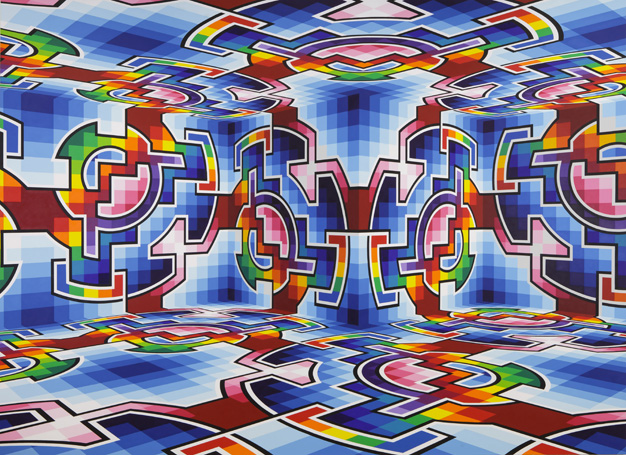ALVAR GULLICHSENInca Modernism 7.2.2015 – 8.3.2015
 Grandmother Ocean (Spirit of the West), 2015
Grandmother Ocean (Spirit of the West), 2015acrylic on canvas
255 x 350 cm
Inca Modernism
It was some years ago that I had the most vividly clear dream. I was on a sandy beach in a foreign country. Large airy paper sculptures floated silently ashore onto the beach. There was an amazing sense of calmness. Close by was a large temple carved into the rocks. The temple had female forms dotted around, reminiscent of the curves of a violin, with intricate mosaic decorations in red, violet, black and white. The goddess of the temple - none other than Mother Earth herself - taught me to affirm my feminine side. This was somehow achieved by me making a hand movement, like an Indian dancer, and I was then lifted upwards until my head was above the clouds. I heard two Tibetan monks singing in unison. Their song became like a horizontal line, giving the sense of perfect equilibrium. With my head still above the clouds, I found myself inside a box or room with geometric art on the walls. They reminded me of the artworks in my grandmother's collection: Léger, Calder, Miro, and others. They simultaneously had ethnic elements to them as well as feeling universal and timeless.
This dream (which was later followed by further inspiring dreams) was of key significance to my artistic process. It took a long time to reconstruct the artwork from my dream, and I still don't quite know exactly what all the elements looked like - perhaps because they were moving objects and their shapes were shifting. Using intuitive sketching (the hands remember things better than the rational mind!), I eventually created compositions and geometric patterns which felt right. My assistant Klaus Nyqvist helped me create virtual rooms with the surfaces covered in these patterns. The basis of the pattern is quadratic modules which can be connected to each other in all directions. I've often searched for references - is there actually art out there that is like what I saw in my dream? Besides the connection to Modernism, I've also found similarities in Buddist mandalas, in science fiction film set designs, in the South African N'debele people's wall paintings, plus in Northern, Central and Southern American native populations' textiles, artefacts and folk art. Similar patterns and shapes emerge in contexts that are widely separated, both temporally and geographically. Maybe our ancestors visited the same dream worlds? A friend of mine calls my paintings "Inca Modernism", which I approve of.
I would like to dedicate this exhibition to my father Kristian, who has given me so much encouragement and support.
Alvar Gullichsen
